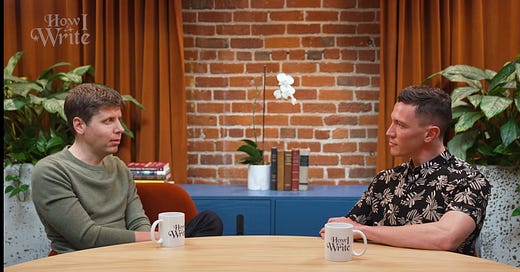Does "If you can't read, you can't write" still hold?
What does a human brain need in order to write, and can Generative AI shortcut it?
I recently listened to OpenAI founder, Sam Altman, speaking on David Perell’s ‘How I write’ podcast.
Altman claims to be an avid writer, but also says he’s not a good one. Sadly Perell never asks him if he’s a good reader.
Perhaps he didn’t need to. Altman hints at his attitudes to reading in these comments:
“Compression is the secret to intelligence. Almost all business books are terrible. There’s like 3 good ideas in 300 pages. What a reader wants is 3 good ideas in 1 page.”
Do we now, Sam? Do we?
This contrasts with the thoughts of William Faulkner:
"Read, read, read. Read everything—trash, classics, good and bad, and see how they do it. Just like a carpenter who works as an apprentice and studies the master. Read! You'll absorb it. Then write."
See the difference? Faulkner would have understand how the ideas are formed. Sam Altman just wants the idea itself. I’ve no doubt he’s a very clever chap with, I suspect, a particular kind of intelligence (I’m not expert enough to define what type that might be). But his view seems coloured by that. Should he speak for all in this regard?
To be fair to him, in this podcast he later goes on to suggest that his intention for Chat-GPT is not to create “final output”, although he has created the ability for it to do so and that is what many people will of course use it for out of laziness or a desire for efficiency.
Altman says:
“If Chat-GPT can help people do a writing-like activity and get higher-quality thinking out of it, that’s wonderful. If we believe that a big part of the value of writing is to clarify your own thinking, and we can have new tools that help you do that better than before, that’ll be a big win”
This seems well-intentioned, but again the emphasis on writing not reading. On shortcutting the conjecture and imagination phase and getting a more efficient output to build on.
I ask myself: Is this a natural reaction from digital natives who have lived their entire lives with information overwhelm? If there is so much information you don’t feel you could ever read enough, would the automatic desire to be to find a way to skip that?
Perhaps that is what the future requires, an informational sieve that strains 300 pages down to the 1 page it can infer you need.
Or is that ability for a machine to infer what an individual human needs, a pipedream?
Or worse still, a method of control? A seemingly benign censor, programmed by a handful of people.
All I can say is that I value, about all else, my own ability to read, to curate information for myself, and generate my own critical thinking. I still believe that process will make me wiser than having more information compressed for me, by a third party.
Even if I’m being inefficient, 300 pages at a time.






The problem with Altmans position is that the "just 3 ideas" may be different for each reader in context. The rest of the book is the platform for context. "Flat glass rectange. Use your fingers. Good web browser". There you go, I invented the iPhone in 3 simple ideas. If you'd my short e-book in 2005, you'd have Apple now, right? Altman is not the first reasonably smart person to vastly overestimate their own intelligence. (Ed. might want to check yourself too Matt).